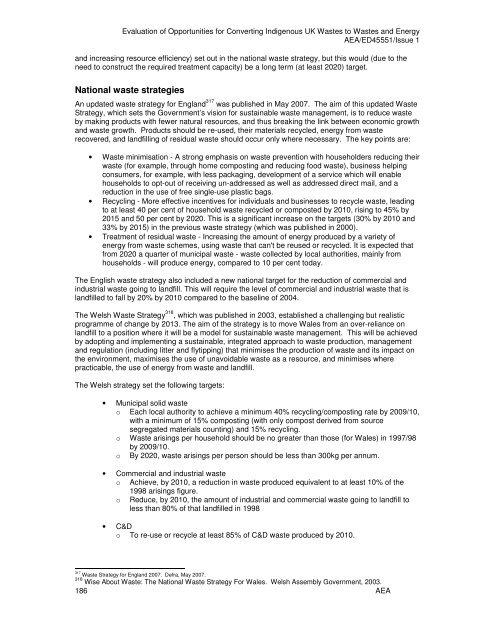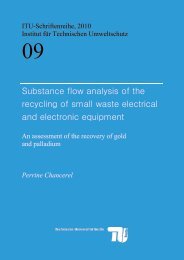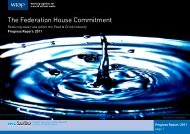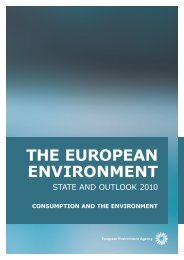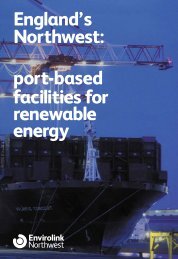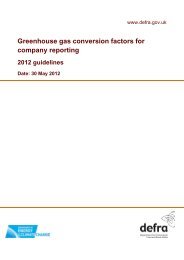to read the full report - Ecolateral by Peter Jones
to read the full report - Ecolateral by Peter Jones
to read the full report - Ecolateral by Peter Jones
You also want an ePaper? Increase the reach of your titles
YUMPU automatically turns print PDFs into web optimized ePapers that Google loves.
Evaluation of Opportunities for Converting Indigenous UK Wastes <strong>to</strong> Wastes and Energy<br />
AEA/ED45551/Issue 1<br />
and increasing resource efficiency) set out in <strong>the</strong> national waste strategy, but this would (due <strong>to</strong> <strong>the</strong><br />
need <strong>to</strong> construct <strong>the</strong> required treatment capacity) be a long term (at least 2020) target.<br />
National waste strategies<br />
An updated waste strategy for England 317 was published in May 2007. The aim of this updated Waste<br />
Strategy, which sets <strong>the</strong> Government’s vision for sustainable waste management, is <strong>to</strong> reduce waste<br />
<strong>by</strong> making products with fewer natural resources, and thus breaking <strong>the</strong> link between economic growth<br />
and waste growth. Products should be re-used, <strong>the</strong>ir materials recycled, energy from waste<br />
recovered, and landfilling of residual waste should occur only where necessary. The key points are:<br />
• Waste minimisation - A strong emphasis on waste prevention with householders reducing <strong>the</strong>ir<br />
waste (for example, through home composting and reducing food waste), business helping<br />
consumers, for example, with less packaging, development of a service which will enable<br />
households <strong>to</strong> opt-out of receiving un-addressed as well as addressed direct mail, and a<br />
reduction in <strong>the</strong> use of free single-use plastic bags.<br />
• Recycling - More effective incentives for individuals and businesses <strong>to</strong> recycle waste, leading<br />
<strong>to</strong> at least 40 per cent of household waste recycled or composted <strong>by</strong> 2010, rising <strong>to</strong> 45% <strong>by</strong><br />
2015 and 50 per cent <strong>by</strong> 2020. This is a significant increase on <strong>the</strong> targets (30% <strong>by</strong> 2010 and<br />
33% <strong>by</strong> 2015) in <strong>the</strong> previous waste strategy (which was published in 2000).<br />
• Treatment of residual waste - Increasing <strong>the</strong> amount of energy produced <strong>by</strong> a variety of<br />
energy from waste schemes, using waste that can't be reused or recycled. It is expected that<br />
from 2020 a quarter of municipal waste - waste collected <strong>by</strong> local authorities, mainly from<br />
households - will produce energy, compared <strong>to</strong> 10 per cent <strong>to</strong>day.<br />
The English waste strategy also included a new national target for <strong>the</strong> reduction of commercial and<br />
industrial waste going <strong>to</strong> landfill. This will require <strong>the</strong> level of commercial and industrial waste that is<br />
landfilled <strong>to</strong> fall <strong>by</strong> 20% <strong>by</strong> 2010 compared <strong>to</strong> <strong>the</strong> baseline of 2004.<br />
The Welsh Waste Strategy 318 , which was published in 2003, established a challenging but realistic<br />
programme of change <strong>by</strong> 2013. The aim of <strong>the</strong> strategy is <strong>to</strong> move Wales from an over-reliance on<br />
landfill <strong>to</strong> a position where it will be a model for sustainable waste management. This will be achieved<br />
<strong>by</strong> adopting and implementing a sustainable, integrated approach <strong>to</strong> waste production, management<br />
and regulation (including litter and flytipping) that minimises <strong>the</strong> production of waste and its impact on<br />
<strong>the</strong> environment, maximises <strong>the</strong> use of unavoidable waste as a resource, and minimises where<br />
practicable, <strong>the</strong> use of energy from waste and landfill.<br />
The Welsh strategy set <strong>the</strong> following targets:<br />
• Municipal solid waste<br />
o Each local authority <strong>to</strong> achieve a minimum 40% recycling/composting rate <strong>by</strong> 2009/10,<br />
with a minimum of 15% composting (with only compost derived from source<br />
segregated materials counting) and 15% recycling.<br />
o Waste arisings per household should be no greater than those (for Wales) in 1997/98<br />
<strong>by</strong> 2009/10.<br />
o By 2020, waste arisings per person should be less than 300kg per annum.<br />
• Commercial and industrial waste<br />
o Achieve, <strong>by</strong> 2010, a reduction in waste produced equivalent <strong>to</strong> at least 10% of <strong>the</strong><br />
1998 arisings figure.<br />
o Reduce, <strong>by</strong> 2010, <strong>the</strong> amount of industrial and commercial waste going <strong>to</strong> landfill <strong>to</strong><br />
less than 80% of that landfilled in 1998<br />
• C&D<br />
o To re-use or recycle at least 85% of C&D waste produced <strong>by</strong> 2010.<br />
317<br />
Waste Strategy for England 2007. Defra, May 2007.<br />
318<br />
Wise About Waste: The National Waste Strategy For Wales. Welsh Assembly Government, 2003.<br />
186 AEA


